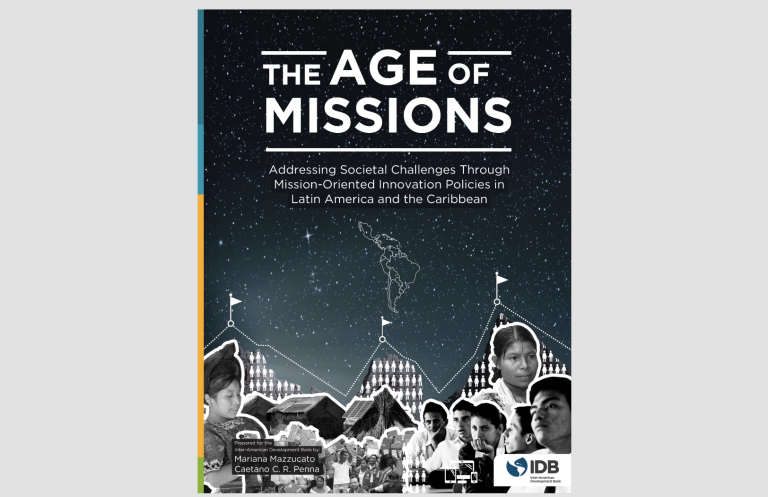Welcome to the “Age of Missions”: innovation policies in Latin America and the Caribbean
24 November 2020
New IDB policy paper by IIPP Director Professor Mariana Mazzucato and Dr. Caetano Penna (Utrecht University) reflects on recent challenge-led innovation policy initiative in Chile, Colombia and Mexico

Countries in Latin America and the Caribbean (LAC) face the challenge of and continuing their socio-economic development path in a smart, sustainable and inclusive direction. In this context, transforming their historically supply-side innovation policies towards a mission-oriented approach can be the way forward.
In a two-year project, the Inter-American Development Bank (IDB) commissioned research, which assessed the level of institutional capacity to implement mission-oriented innovation policies in Chile, Colombia, and Mexico. The mission-oriented innovation approach has been developed and pioneered at IIPP and by the work of Professor Mazzucato, and is being increasingly adopted by governments at national, regional and intra-national level around the world. In particular, since 2018 IIPP has worked to advise on the development and implementation of missions at European level, with the €84bn Horizon Europe research, science and innovation programme led by five missions; and at national level with countries including the UK, Italy, Scotland and South Africa, to name a few. We have also worked on the development of mission-oriented approaches with intra-national organisations like the OECD and UN.
The initiative in Latin America and the Caribbean was coordinated by Vanderleia Radaelli (Science, Technology, and Innovation Lead Specialist at the IDB) and carried out by local research teams led by Nunzia Saporito (Chile), Iván Hernández (Colombia), and Gabriela Dutrénit (Mexico), who received expert advice from Professor Mazzucato and Dr Penna. Through six case studies, the project sought insights into how the institutional capacity of the public sector in a selection of LAC countries should be strengthened to enable implementation of a mission-oriented approach to innovation policy that can help the country to achieve smart, inclusive, and sustainable long-term growth. The six case studies were:
- Mining as a Platform for Virtuous, Sustainable, and Inclusive Development (Chile)
- National Fiber Optic Plan (Colombia)
- Monterrey as an International Knowledge-City (Mexico)
- Solar Energy as an Enabling Factor for Innovation-Based Development (Chile)
- Medellin, The Most Educated (Colombia)
- National Strategy for Control and Prevention of Overweight, Obesity, and Diabetes (Mexico)
On November 16th, 2020, the IDB promoted a webinar to launch the policy paper The Age of Missions: Addressing Societal Challenges Through Mission-Oriented Innovation Policies in Latin America and the Caribbean, available both in English and Spanish, that synthetized the conceptual framework adopted in the project and its main findings. On the occasion, Professor Mazzucato made the keynote speech entitled How to face development challenges using Mission Oriented Innovation Policies? Her remarks were followed by comments by Roberto Salvarezza, Argentina’s Minister of Science and Technology; Paola Vega, Costa Rica’s Minister of Science, Technology and Telecommunications, and Carolina Torrealba, Chile’s Subsecretary of Science, Technology and Innovation. The second half of the webinar was dedicated to the presentation of the country case studies, by the lead researchers, in session moderated by Dr. Penna that lead to an engaged debate with the audience.
Gonzalo Rivas, Head of the Competitiveness, Technology and Innovation Division at IDB, who opened and closed the event, made the following comment:
What has happened in recent years is that now the idea that innovation must be given meaning and direction is widely accepted. And that creates other types of complexities. It is necessary to generate an intervention that is much more complex, an intervention that has to do with the idea of a “whole government approach” but also with a “whole society approach”. One of the advantages of mission research, and all that we call transformational innovation, is that it allows us to lead with big development goals. The studies that were implemented in Chile, Mexico and Colombia aim precisely to highlight the need to better invest in both institutional and basic capacities.
Read more on IIPP's Mission-Oriented Innovation
 Close
Close

